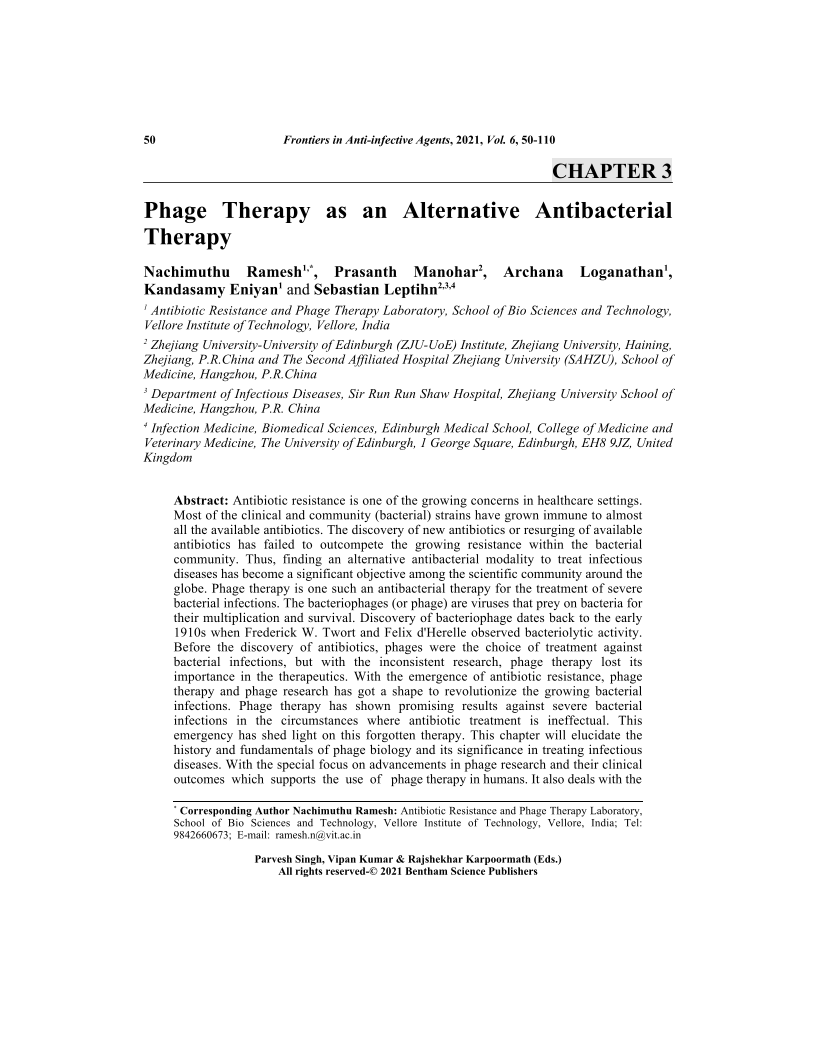Phage Therapy as an Alternative Antibacterial Therapy

- Authors: Nachimuthu Ramesh1, Prasanth Manohar2, Archana Loganathan3, Kandasamy Eniyan4, Sebastian Leptihn5
-
View Affiliations Hide Affiliations1 Antibiotic Resistance and Phage Therapy Laboratory, School of Bio Sciences and Technology, Vellore Institute of Technology, Vellore, India 2 Zhejiang University University of Edinburgh (ZJU-UoE) Institute, Zhejiang University, Haining, Zhejiang, P.R.China and The Second Affiliated Hospital Zhejiang University (SAHZU), School of Medicine, Hangzhou, China 3 Antibiotic Resistance and Phage Therapy Laboratory, School of Bio Sciences and Technology, Vellore Institute of Technology, Vellore, India 4 Antibiotic Resistance and Phage Therapy Laboratory, School of Bio Sciences and Technology, Vellore Institute of Technology, Vellore, India 5 Zhejiang University-University of Edinburgh (ZJU-UoE) Institute, Zhejiang University, Haining, Zhejiang, P.R.China and The Second Affiliated Hospital Zhejiang University (SAHZU), School of Medicine, Hangzhou, China
- Source: Frontiers in Anti-Infective Agents: Volume 6 , pp 50-110
- Publication Date: November 2021
- Language: English
Phage Therapy as an Alternative Antibacterial Therapy, Page 1 of 1
< Previous page | Next page > /docserver/preview/fulltext/9789814998420/chapter-3-1.gif
Antibiotic resistance is one of the growing concerns in healthcare settings. Most of the clinical and community (bacterial) strains have grown immune to almost all the available antibiotics. The discovery of new antibiotics or resurging of available antibiotics has failed to outcompete the growing resistance within the bacterial community. Thus, finding an alternative antibacterial modality to treat infectious diseases has become a significant objective among the scientific community around the globe. Phage therapy is one such an antibacterial therapy for the treatment of severe bacterial infections. The bacteriophages (or phage) are viruses that prey on bacteria for their multiplication and survival. Discovery of bacteriophage dates back to the early 1910s when Frederick W. Twort and Felix d'Herelle observed bacteriolytic activity. Before the discovery of antibiotics, phages were the choice of treatment against bacterial infections, but with the inconsistent research, phage therapy lost its importance in the therapeutics. With the emergence of antibiotic resistance, phage therapy and phage research has got a shape to revolutionize the growing bacterial infections. Phage therapy has shown promising results against severe bacterial infections in the circumstances where antibiotic treatment is ineffectual. This emergency has shed light on this forgotten therapy. This chapter will elucidate the history and fundamentals of phage biology and its significance in treating infectious diseases. With the special focus on advancements in phage research and their clinical outcomes which supports the use of phage therapy in humans. It also deals with the regulatory inputs required for phage therapy and the commercialization strategies undertaken by pharmaceuticals in the globalization of phage medicine. Besides, the authors would like to brief on the personalized phage therapy and their evolution from lab to bedside endpoints for treating the patients and other future perspectives that hold promise.
-
From This Site
/content/books/9789814998420.chapter-3dcterms_subject,pub_keyword-contentType:Journal -contentType:Figure -contentType:Table -contentType:SupplementaryData105

